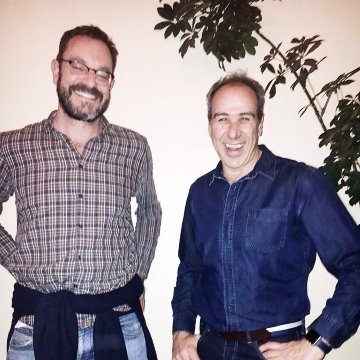click to dowload our latest edition
CLICK HERE TO SUBSCRIBE TO OUR NEWSLETTER


Published
7 years agoon
By
adminDAVID ANSARA
Chipkin is one of the lead authors of the recent academic report into state capture: Betrayal of the Promise: How South Africa is being stolen. He was being publicly interviewed about the findings of the report by author and researcher Antony Altbeker on Tuesday evening.
Chipkin says the motivation for the report was to “join the dots” of the many journalistic accounts of corrupt activity that already exist in the public domain, and to organise these into a single coherent account of state capture.
“We were trying to move the analysis away from endless stories of corruption. We wanted to make sense of the fact that this is not simply criminals who have seized the state’s power and are looting for their own private interests. Rather, we need to understand that there is a political project that creates the context in which some of this criminality happens that creates a space for illegality to occur,” Chipkin said.
This political project is given a cover of legitimacy by the concept of “radical economic transformation”. Chipkin argued that while it was necessary to reconfigure the South African economy, the concept of “radical economic transformation” was being used to attack democratic institutions and subvert the law.
Altbeker asked him how the concept of radical economic transformation came about and why it was being used in this way. Chipkin said this change began in 2007 at the ANC elective conference in Polokwane. This represented “not just a revolt within the ANC, but a fundamental repudiation of a particular political economy, and especially the politics of Thabo Mbeki”.
Chipkin argued that the early conception of black economic empowerment (BEE) and affirmative action, were premised on the idea that you can “cajole, push and incentivise white business to transform itself by putting in place quotas and incentives”.
However, while this resulted in the emergence of a small, black upper class, it also led to “massive economic exclusion” of poor, uneducated people. Because of this imbalance, Chipkin believed there was a sincere attempt on behalf of the ANC government to transform the economy after Polokwane and that this was done “in good faith”.
One of the primary pillars of this new economic strategy was the use of public procurement as a mechanism for incentivising local production, Chipkin explained.
By leveraging the significant procurement budgets of state-owned enterprises (SOEs), government sought to achieve two aims. The first was to displace white business and the second, to incentivise a new black industrial economy.
However, he said, this resulted in procurement contracts being channelled to “black-owned companies, irrespective of price and irrespective of experience”.
He added: “Here is where things get very complicated. We argue [in the report] that this model of transformation radicalises when it comes up against the Constitution, the law, and when it comes up against National Treasury.”
Chipkin explained that given Treasury’s constitutional mandate to ensure due process is followed with regards to state procurement, this new transformation strategy is met with increased resistance from the Minister of Finance.
“As a result, from 2011 we start to see the government increasingly move outside of legal norms and procurement begins to actively flout the law. This is motivated by political self-righteousness, and the idea that the rules of the game are rigged against black people, so the only way of achieving real break-throughs, is to break the rules,” he posited.
Chipkin noted that this period also saw sustained assaults being made against public institutions, particularly those with significant investigative and prosecutorial capacities.
The first example of this was the attack on the South African Revenue Service (SARS) in December 2014, which had begun to investigate tax evasion among politically-connected individuals, including those operating in the illegal tobacco industry (Chipkin noted that the Zuma family is alleged to be involved in the illicit trade of cigarettes).
These attacks took the form of fabricated intelligence reports of a “rogue unit” in SARS, and other spurious allegations, such as spying on the President and (even) running a brothel.
These allegations were then used to suspend the entire senior leadership of SARS and to lay criminal charges against then Deputy Commissioner Ivan Pillay and Pravin Gordhan, the former Commissioner and later Minister of Finance. Similar moves were made against the leadership of the Hawks and the National Prosecuting Authority (NPA).
In parallel to these attacks on independent institutions, a “shadow state” has emerged, where key decision-making has receded from Parliament, the Cabinet, and even the ANC. Real power and decision-making now resides in informal locations such as the Gupta family residence in Saxonwold, Chipkin said.
This has resulted in a “repurposing of state institutions” away from governance and towards large-scale rent-seeking and patronage distribution.
Chipkin argued that the Constitution must not be seen as a barrier, but rather as an enabler of transformation in South Africa.
